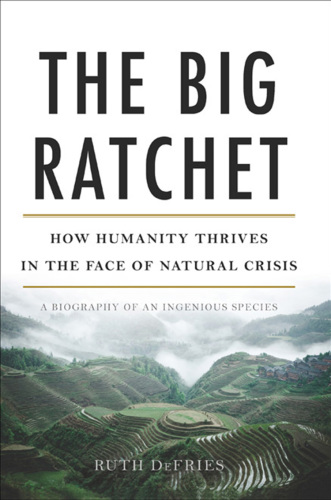
The Big Ratchet
How Humanity Thrives in the Face of Natural Crisis
کتاب های مرتبط
- اطلاعات
- نقد و بررسی
- دیدگاه کاربران
نقد و بررسی

June 30, 2014
Columbia professor and MacArthur fellow DeFries (Ecosystems and Land Use Change) follows the trajectory of the human species by tracing how we meet our most basic need—feeding ourselves. DeFries frames humanity’s relationship to the environment in three-step cycles of pivots, new innovations that allow us to stave off hunger by extracting energy from nature more efficiently; ratchets, the population increase that this new bounty allows; and hatchets, obstacles that arise when the innovation has reached a limit that lead to the invention of new pivots. Her history of agriculture tracks our path from hunter-gatherers to farmers to city dwellers: in each successive stage we have grown more reliant on the efforts of fewer people to feed more, and have utilized sources of energy which steal fewer of the calories by moving from human power, to animal power, to the power of fossil fuels. Neither technophile nor doomsayer, DeFries sees today’s hatchet not in overpopulation but in the uneven distribution of access to new methods and in the declining quality of the human diet. DeFries places her faith in human creativity as a primary means to our survival, an appealing point of view for the hopeful but concerned reader. B&w images.

July 1, 2014
A solid, cheerful scientific account of how humans have dealt with disasters throughout history.MacArthur Fellow DeFries (Ecology, Evolution and Environmental Biology/Columbia Univ.; Ecosystems and Land Use Change, 2004, etc.) emphasizes that progress in human history depended mostly on success in feeding ourselves. For thousands of years, hunter-gatherers ate well. The largely grain diet consumed after the arrival of agriculture 10,000 years ago was unhealthy, but its vast increase in quantity produced a population explosion, cities and civilizations. DeFries describes each subsequent advance as a "pivot" that inevitably overshoots, leading to "hatchets" (i.e., famine, drought, epidemics) overcome by advances (better ploughs, irrigation systems, sewers, fertilizers) that "ratchet" up our well-being but inevitably lead to further difficulties. Her first example of this process is the development of the potato, imported from South America after 1500. Nutritious and easy to grow, it became a staple, resulting in larger numbers of healthier Europeans. Readers are familiar with the 1845 potato blight that led to famine and depopulation, especially in Ireland. While historians usually stop there, DeFries points out that the blight still exists, but resistant strains and improved agricultural practices have restored production, even in Ireland. It wasn't pretty, but human inventiveness applied to the potato led to a ratchet in our well-being. The Big Ratchet occurred during the second half of the 20th century when, thanks to pesticides, industrial farming, massive fertilizer use and genetic improvements, worldwide production of corn and rice nearly tripled and wheat more than doubled. Food is more abundant than ever, but other problems have emerged. "As long as civilization exists," writes the author, "we will be grappling with how to hijack nature to feed ourselves."An admirable history of human ingenuity that does not claim it will overcome such looming crises as overpopulation and global warming.
COPYRIGHT(2014) Kirkus Reviews, ALL RIGHTS RESERVED.

























دیدگاه کاربران